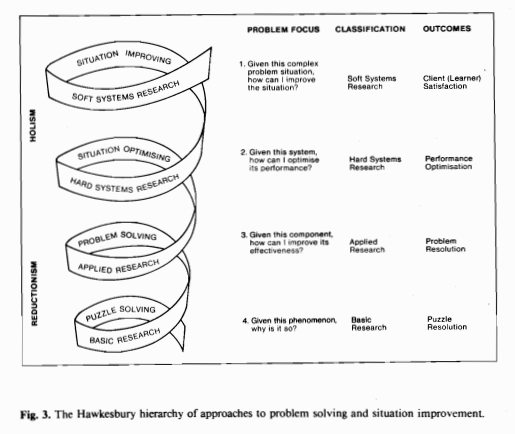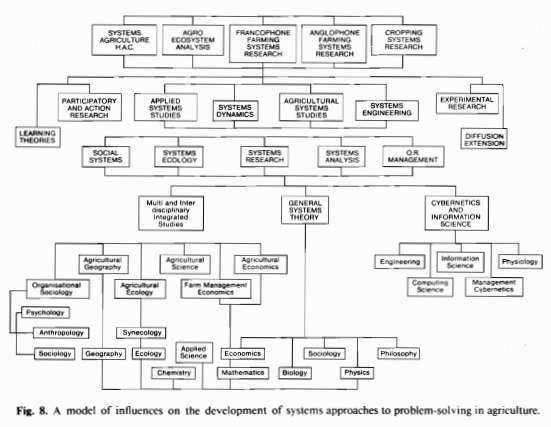There are numerous definitions and practices around Farming Systems Research (FSR). However, according to the ACIAR definition of Farming Systems Research it is:
- Research related to the smallholder, subsistence-orientated agriculture sector because this is the principal target group for FSR through ACIAR;
- FSR projects are multidisciplinary and holistic in perspective, therefore projects are not only concerned with productivity but also the sustainability of outputs and the equity; implications of recommenced changes to the farming system and the trade-offs involved
- Farmer participation in the research including diagnosis of the problem and verification of innovations (new practices or inputs) through farm trials;
- Research is applied and short-term rather than long term research; and
- FSR processes will involve one or all of these elements – system description, diagnosis and problem specification, on-station solution design, on-station solution testing followed by on-farm solution verification, extension of research, training and policy formulation to support the extension system.
(Remenyi, and the Australian Centre for International Agricultural Research, 1985)
The FSR approach is to connect the farmer with the researcher.
The primary objective is to improve the well-being of individual farming families by increasing on-farm productivity, given the constraints imposed by resources and the environment. Improving productivity is based on the development and dissemination of relevant improved technologies, as well as:
- Practices and implementation of appropriate policy
- Support systems to create opportunities for improved production systems; and
- An enabling environment to adopt technologies.
This recognises that inappropriate technologies and policies that are incompatible with local conditions (biophysical, social and economic) have been major barriers to farmers adopting R&D outputs and changing farm practices.
It is a whole-farm systems approach, where if a sub-system is the focus of the research, there needs to be recognition of how this sub-system connects to the wider farm system (i.e. it is about the interactions between system components).
General characteristics
In practice there are no clear boundaries between the stages of the approach (e.g. design activities may emerge during the testing stage as promising alternatives develop). This is a strength of the FSR approach because it incorporates adaptive on-farm testing to become inputs to further testing on an experiment station. This develops appropriate innovations that will assist in sustaining the livelihoods of farming families.
FSR process is recognised as dynamic and iterative with linkages in both directions between farmers, researchers and funding agencies. However, the farming family is at the centre of the FSR project.
Hawkesbury FSR model (Bawden et al., 1985))
In acknowledgement of the reductionist nature of agricultural science and the limitations of management science with its focus on optimising productivity, the authors argue for a FSR approach that encompasses the interactive nature of doing agriculture – placing the farmer within both a natural and social environment: a social-ecological systems approach.
A soft systems approach is useful when the situation is uncertain or involves conflict about what constitutes the problem. This is in contrast to a hard systems approach when the situation is represented as a clear statement of intent.
To locate the soft systems approach in relation to other FSR approaches, the authors have developed a hierarchy of methodologies, ranging from reductionist to holistic depending on need, situation or stage of the research process.

The Hawkesbury hierarchy of approaches to problem solving and situation improvement- Remenyi, J. V. & Australian Centre for International Agricultural Research. (1985) Agricultural systems research for developing countries: proceedings of an international workshop at Hawkesbury Agricultural College Richmond, N.S.W., Australia 12-15 May 1985 / editor: J.V. Remenyi Australian Centre for International Agricultural Research Canberra p:34
A soft systems approach is compatible with the Hawkesbury approach, as it allows for informed debate about the problem and change desired with the farmers. This is an integral part of the problem solving process as a social learning process.
In the Hawkesbury approach, learning is the key element of the FSR process. It is:
- An active transformation process in which people attempt to make meaning out of their dynamic environment; and
- A mutual inquiry that is practiced as action research – learning by doing.
The starting point of the Hawkesbury approach is when the researcher joins an individual or group who are concerned about their situation. The situation is likely to involve a collection of problems rather than a single issue.
The model of influences on the development of systems approaches to problem-solving in agriculture has five main approaches, ranging from ‘soft’ systems to ‘hard’ systems:
- Systems agriculture
- Agro ecosystem analysis
- Francophone farming systems research
- Anglophone farming systems research
- Cropping systems research

A model of influences on the development of system approaches to problem-solving in agriculture – Remenyi, J. V. & Australian Centre for International Agricultural Research. (1985) Agricultural systems research for developing countries: Proceedings of an international workshop at Hawkesbury Agricultural College Richmond, N.S.W., Australia 12-15 May 1985 / editor: J.V. Remenyi Australian Centre for International Agricultural Research Canberra p:38
While all five approaches have much in common and are complementary (they all focus on multidisciplinary studies and have commitment to systems thinking and practice), the authors distinguish that the systems’ movement performs more than an integrative function – it also involves a major shift in understanding how we think and learn as both emergent and hierarchical, involving communication, interaction and control.
FSR in the Australian context – Remenyi and Coxhead, Simmonds (1984) – has identified three basic types of FSR:
- Strictly academic: often detailed and involving modelling but not intended to be an immediate solution for implementation by the farmer.
- FSR with on-farm research (OFR): isolates a sub-system of the whole farm and then process to experiment on-farm with farmers’ collaboration as a fairly rapid process.
- FSR intended to be result in radically New Farm Systems (NFS): requiring government intervention to provide the economic and institutional support for adoption and implementation.
Australian FSR practice has tended to focus on NFS as compared with the FSR/OFR that is considered more relevant to the situation of subsistence farmers.
Content sources and further information
Remenyi, J. V. and Australian Centre for International Agricultural Research. (1985). Agricultural systems research for developing countries: Proceedings of an international workshop at Hawkesbury Agricultural College, Richmond, N.S.W., Australia 12-15 May 1985/ editor: J. V. Remenyi Australian Centre for International Research, Canberra.
Bawden, R. J., Ison, R. Macadam, R. D., Packham, R. G. and Valentine, I. (1985) A research paradigm for systems agriculture in Agricultural systems research for developing countries: Proceedings of an international workshop at Hawkesbury Agricultural College, Richmond, N.S.W., Australia 12-15 May 1985/ editor: J. V. Remenyi Australian Centre for International Research, Canberra.
Farming Systems Research into the 21st Century. The New Dynamic. Edited by I. Darnhofer, D. Gibbon and B. Dedieu. Dordrecht: Springer Science + Business Media (2012), pp. 490, ISBN 978-94-007-4502-5 [US/European context]
Collinson, M. (2000) A history of farming systems research. Wallingford, UK. Food and Agriculture Organisation of the United Nations/Centre for Agriculture and Biosciences International>http://trove.nla.gov.au/work/16047516?versionId=46557113
